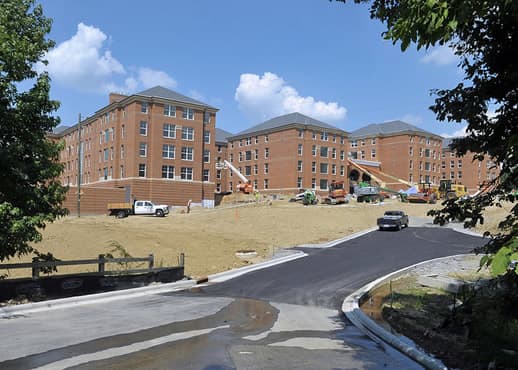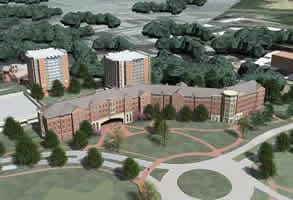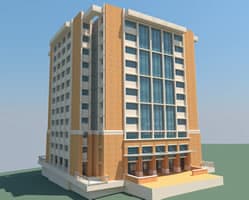
On Monday, Gov. Pat McCrory signed a bill that will enable six UNC system campuses, including UNC Charlotte, to fund construction projects.
UNC Charlotte will issue bonds to finance $129 million to complete four non-appropriated capital improvements that University leaders have identified as critical to campus growth.
“While some schools are seeing their numbers decline, demand for UNC Charlotte is growing dramatically in parallel to the Charlotte region’s rapid population increase,” wrote Chancellor Philip L. Dubois in an op-ed published in the Charlotte Business Journal.
During the past five years, growth at UNC system institutions has totaled about 6,800 students; UNC Charlotte is responsible for 48 percent of that growth. Since 2005, applications for enrollment at the University have increased nearly 80 percent, and they are up almost 8 percent in the last year (15,500 completed applications for 2014 versus 14,441 for 2013).
The new construction will advance the evolution of UNC Charlotte as a residential campus and will continue to provide construction/renovation jobs in the region, said John Bland, director of public relations, who added the investment will further strengthen the greater Charlotte area and the University for years to come.
A student fee increase of $50, beginning with the 2014-15 academic year, will support the bond issuance and repayment of the infrastructure projects along with room rents for the residence halls; neither tuition nor taxpayer monies were appropriated for these projects, which are:
 Residence Hall Phase XIV ($49,000,000)
Residence Hall Phase XIV ($49,000,000)
- This proposed project will construct a 400-plus bed residence hall to accommodate growth of the University and support student success and retention. The building will be located in the South Village area of campus and will house both freshmen and upper-class students. It will include suite- and apartment-style room configurations. Each floor will have study rooms, multipurpose lounge and laundry. Additionally, this building will house the University's Honors College and Levine Scholars Program. Administrative and seminar space will be provided for these programs. The building exterior will be brick and precast concrete as is typical for campus. Design will incorporate sustainable features and energy efficient systems.
Campus Infrastructure Development Phase II ($46,000,000)
- This project will include renovations of aging infrastructure in the University's chemistry/physics building (Burson), modernization of infrastructure in several aging buildings in the core of campus, continued improvements to Wi-Fi and network capacity in support of student success, needed infrastructure additions in the East Student Village to include road improvements and water, electrical and telecom lines. This initiative also will include installation of energy efficient systems and will reduce energy costs.
 Sanford Hall Renovation ($19,000,000)
Sanford Hall Renovation ($19,000,000)
- A 106,096-square-foot, 500-bed residence facility Sanford Hall was built in 1969. Renovations will bring the facility to current building code with work focusing on plumbing, electrical and elevator upgrades. The project includes HVAC modernization that ties the building into the regional utility plant in South Village. In addition, the project will install a new roof and a brick façade on the exterior. As part of the renovation, the student rooms and rest rooms will be re-configured to a more desirable layout with some loss of existing beds. Design will incorporate sustainable features and energy efficient systems.
Elm/Maple/Pine Renovation ($18,550,000)
- The Elm, Maple, Pine complex is a 252-bed student residence facility built in 1987. Renovation will update the mechanical, electrical, information technology and plumbing systems and modernize the interiors. The project will include window and roof replacements, six new elevators, installation of new chiller and boiler in complex utility plant, hot and chilled water line extensions and ADA modifications to meet existing code requirements. Design will incorporate sustainable features and energy efficient systems.
Housing and residence life (HRL) officials expect the University to house 5,383 students on campus this fall. Completion of the HRL master plan calls for campus housing eventually to accommodate roughly 7,000 students.
Betty Doster, special assistant to the chancellor for constituent relations, expressed appreciation for Rep. Bill Brawley (R-Mecklenburg and 1978 UNC Charlotte alumnus). “He sponsored this legislation and led the successful efforts resulting in passage of a bill that is important to the growth of our campus. The University is grateful for his support and commitment to higher education in North Carolina.”